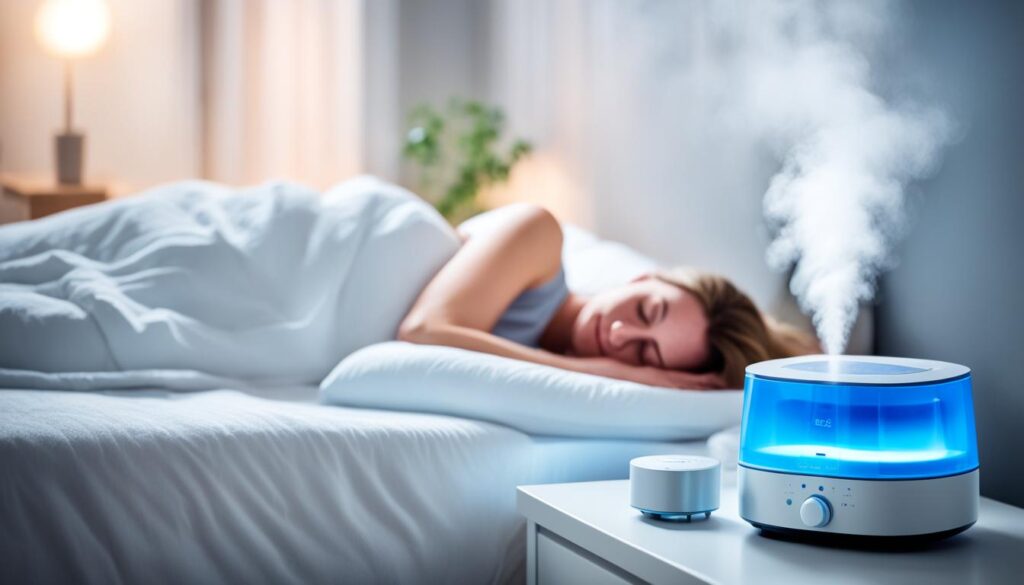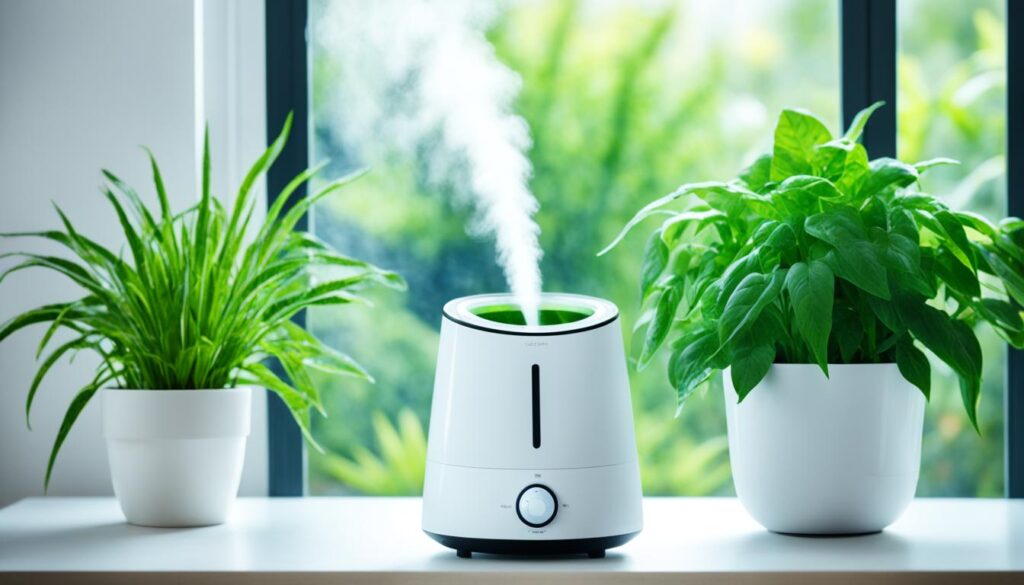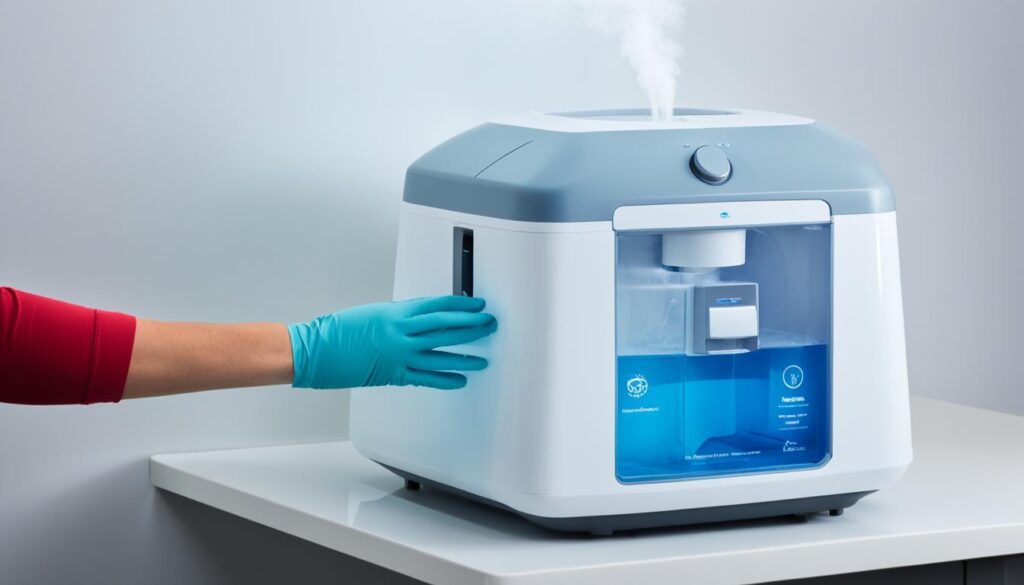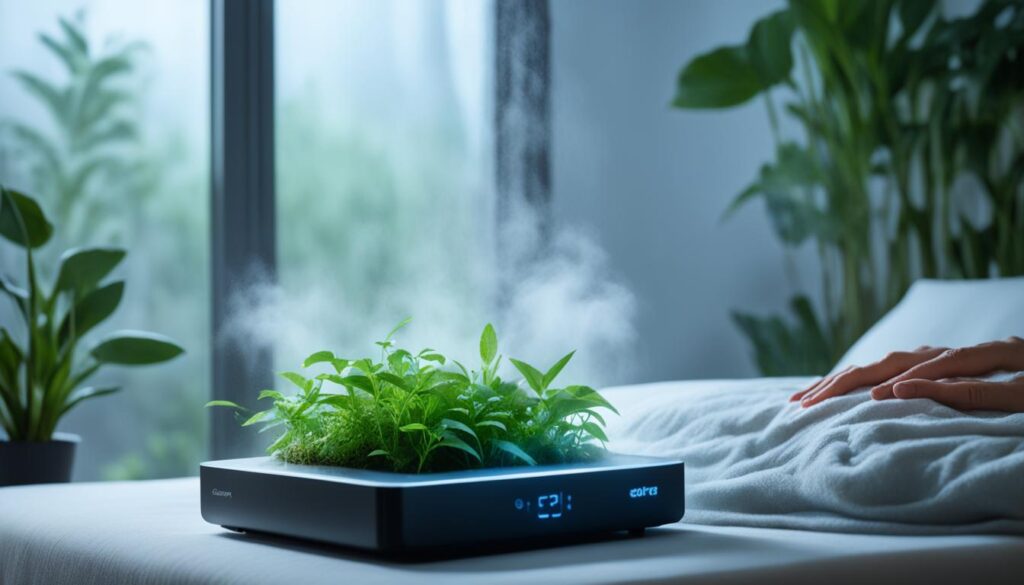Eczema affects a lot of people, about 1 in 10, including babies and kids. It makes the skin dry, itchy, and red. Humidifiers might help ease these symptoms, but do they really work for eczema?
Humidity, or the amount of moisture in the air, is key. Since our skin is mostly water, low humidity can make eczema worse by drying out the skin. Humidifiers can put moisture back in the air. This might help calm the skin and make it healthier.
But, using a humidifier for eczema needs thought. You must keep the humidity between 30–60% to avoid mold and more allergens. Also, the room’s size, type of humidifier, and its upkeep are important in seeing gains for your eczema symptoms.
So, is a humidifier a good idea for managing eczema? Let’s dive deeper to figure out if it’s beneficial.
Key Takeaways:
- Low humidity can make eczema worse by drying out the skin.
- Humidifiers can add moisture to the air, relieving dryness and cutting down on the itch and flakes.
- The best humidity levels are between 30-60% for people with eczema.
- When choosing a humidifier, think about the room’s size and whether a cool-mist or warm-mist one is better.
- Maintaining the humidifier well, such as cleaning and changing the water daily, is vital to stop mold.
How does a humidifier help with eczema?
Dry air can make eczema worse by making the skin dry. This common issue affects many people, causing their skin to become dry and itchy. When the air is dry, it pulls moisture out of your skin.
A humidifier puts moisture back into the air, making the environment more humid. This helps reduce dryness, itchiness, and flakiness. Since skin is mostly made of water, the extra moisture can help keep it hydrated, calming any irritation.
A humidifier releases water vapor, which adds to the indoor humidity. This moist air fights the dryness, giving relief to those with eczema. It creates a more soothing environment for the skin.
Though helpful, a humidifier is just one part of treating eczema. The amount of moisture in the air, the season, and other triggers are important to think about. Follow the right humidity level (about 30-60%) to prevent mold and pests.
Using a humidifier can make a home more comfortable for people with eczema. It reduces dryness and the associated discomfort, making life better for those battling with eczema.
Will a humidifier make a difference?
Many people with eczema wonder if using a humidifier can help them. The effectiveness of a humidifier depends on a few things. This includes how dry the air is at home, the season, and other things that might make eczema worse. While a humidifier can add moisture to the air, it’s not a stand-alone solution for eczema.
Eczema makes skin dry, itchy, and inflamed. Dry air is a known trigger for some people. A humidifier adds moisture to the air, which fights off dryness. This might help reduce itching and flaking. But remember, a humidifier might not work the same for everyone.
First off, check your home’s humidity level. The best range for indoor humidity is between 40-50%. This range supports healthy skin. If your home is already in this range, a humidifier might not make a big difference.
The season matters too. Winter tends to dry out the air with heating systems. That’s when a humidifier can be really helpful. On the other hand, summer air might be humid enough without a humidifier’s help.
It’s also crucial to look at other things that can make eczema worse. Items like strong soaps or allergens are common triggers. It’s vital to handle these triggers, along with using a humidifier, to manage eczema well.
Although a humidifier is a good addition for treating eczema, it’s not the only step. Remember to moisturize often, use gentle skin products, and avoid known triggers. By using a humidifier alongside these steps, you increase your chance of relief. This could lead to better skin health overall.
How do you use a humidifier to treat the symptoms of eczema?
A humidifier can help soothe eczema symptoms and make your skin healthier. It puts moisture into the air, fighting the dryness that makes eczema worse. Here’s how to use a humidifier well for eczema relief:
1. Timing is key
Start your humidifier at least thirty minutes before bed. This gives the air time to moisten. It makes your sleeping environment better for your skin.
2. Consider the room size
Choose a humidifier size based on your room. A small one works for rooms up to 300 square feet. 300-500 square feet needs a medium size, and over 500 square feet needs a large one.
3. Keep it clean
Keeping your humidifier clean is a must, especially if you have eczema. Dirty humidifiers can add mold and bacteria to the air, making eczema worse. Clean it as the manufacturer says. Using special filters or ultrasonic humidifiers can help prevent mold and lower noise too.
4. Mold prevention
Eczema patients should watch out for mold when using a humidifier. Keep humidity between 30-60% to avoid mold growth. A cool-mist humidifier is better for eczema because it doesn’t have the burn risk of warm-mist ones.
5. Incorporate into a comprehensive treatment plan
Humidifiers are part of a larger eczema treatment plan. Dermatologists might suggest lotions, medications, or light therapy. Using a humidifier with these treatments can improve your skin’s health and manage your eczema well.
Humidifiers can make your home a better place for your eczema. They keep your skin comfortable, soft, and less likely to get infections. Just remember to use the humidifier correctly, keep it clean, and work with other treatments advised by your doctor.
Are there any precautions for using a humidifier for eczema?
Humidifiers can help people with eczema, but they need careful use. It’s crucial to follow certain steps to keep them safe and working well. Let’s look at some tips:
Cleaning and Maintenance:
- Clean your humidifier regularly: Keep it clean to stop harmful things like limescale, mold, and dust mites. Always follow the guide for the right way to clean it.
- Use distilled water: Using distilled water helps stop harmful minerals and bacteria in the humidifier.
Safety Precautions:
- Keep the humidifier out of reach: If it uses warm mist, there’s a burn risk from boiling water. So, keep it high where kids and pets can’t get it.
- Monitor humidity levels: It’s key to keep humidity at 30-60% for eczema but high humidity can cause mold. Use a meter to check and adjust moisture levels as needed.
Follow Recommendations:
- Follow the National Eczema Society’s recommendations: They advise 30-60% indoor humidity for eczema. Yet, everyone’s needs are unique. A doctor can help find the best level for you.
- Consider individual sensitivities: Everyone reacts differently to humidity changes. Watch your own comfort and adjust the humidifier settings accordingly.
With these steps, you can use a humidifier safely for your eczema. Remember to talk to your doctor for the best advice for you personally.
Is there an ideal humidity level for eczema-prone individuals?
Eczema is a common skin issue, affecting 1 in 10 people at some point, including kids and babies. Dry air and low humidity make it worse. So, finding the right humidity level is key for those with eczema.
The National Eczema Society suggests indoor humidity be between 30–60%. This moisture stops skin from getting too dry. Yet, what’s perfect for one person might not be for another. Everyone reacts differently to humidity.
Too much humidity isn’t good either. It can make places feel sticky, and mold and pests like cockroaches might appear. Humidity over 60% can cause mold, making eczema worse. So, you need a moist but not too damp atmosphere.
A humidifier can be a big help. It keeps the air moist and can stop eczema flare-ups. Choose the size based on your room’s square footage. Small ones are for up to 300 square feet, mediums for 300–500, and larges for more than 500 square feet.
But using a humidifier isn’t the only thing to do. Proper skin care is also vital. This includes not taking hot baths, using gentle soaps, and moisturizing the skin often
Some experts say using a humidifier in dry seasons, like winter, can help. But, always talk to a doctor or a dermatologist for the best advice.
Can humidifiers prevent eczema flares?
Using humidifiers might reduce eczema flares, but more studies are needed. Some research shows they work best during dry months. This is because dry air in winter can make eczema worse by drying out the skin. Humidifiers add moisture to the air, helping people with eczema feel less dry and uncomfortable.
Eczema is a common skin problem, affecting about 1 in 10 people, including kids. It causes the skin to be dry, itchy, and red. When the air is very dry, it sucks moisture out of the skin, making eczema symptoms worse. The best humidity level for those prone to eczema is between 30-60%. This keeps the skin moist and healthy.
“Using a humidifier during dry periods like winter may help relieve eczema symptoms, but it is essential to monitor humidity levels and ensure safe use.” – National Eczema Society
Humidifiers are available in different sizes for various room sizes. You need to select the right size for the best effect. Also, it’s crucial to clean your humidifier often. This prevents mold, dust mites, and bacteria, which can make eczema worse and harm air quality.
Warm-mist humidifiers are not the best choice for eczema sufferers. They can cause burns and should be used carefully, especially near children or pets. Cool mist humidifiers are safer and often recommended for eczema management.
In 2016, a study involving over 3,000 children linked humidifier use to a higher risk of eczema. However, we need more research to be sure about the role of humidifiers in eczema. Using humidifiers with other treatment methods, like moisturizing and avoiding triggers, is a good approach to managing eczema.
To sum up, while using humidifiers may help, we need to know more about how they work for eczema. It’s wise to keep indoor humidity at 30-60%, as the National Eczema Society suggests, to support healthy skin.
How do humidifiers relieve eczema symptoms?
Humidifiers are key to helping with eczema. They work by fighting the effects of dry air. This dryness can make skin lose water, leading to eczema. The skin is mostly water, so losing moisture makes eczema worse.
Humidifiers put moisture back into the air. This helps keep the skin hydrated and stops it from losing more water. They make the skin’s environment better, easing the dryness and itchiness of eczema.
Using humidifiers is good, but other steps can make a bigger difference. Barrier creams and thick lotions are good. They seal in moisture, protecting the skin from dry air and helping it keep water. This lowers how often and how severe eczema symptoms are.
But remember, humidifiers alone aren’t enough. To beat eczema, they should be part of a bigger plan. This plan includes keeping skin moist with regular lotion and using products that are gentle on the skin.
Quote:
“Humidifiers provide relief for individuals with eczema by maintaining skin hydration and reducing moisture loss. Alongside the use of barrier creams and thicker lotions, they form an integral part of a comprehensive eczema treatment plan.” – Dermatology Specialist
Taking care of your humidifier is important. Clean it often and use clean water to avoid mold and bacteria. Also, choose one with filters to stop mold and lower the chance of breathing issues.
To sum it up, humidifiers work by fixing dry air. They keep the right amount of moisture, making the skin better. Together with skin creams, they are a strong way to tackle and reduce eczema symptoms.
Using humidifiers as part of eczema management
Humidifiers help with eczema symptoms by putting moisture in the air. This can make the skin less dry, itchy, and flaky. But, they should be part of a bigger plan to manage eczema.
To treat eczema well, you’ll need to keep the skin moist. Use skin products that are gentle and don’t have fragrances. It’s best to choose moisturizers made for sensitive skin.
It’s also vital to keep the air’s moisture at a good level, between 30-60%. Too much moisture can lead to mold, so be careful. Pick a humidifier that fits the room size. Small ones are good for up to 300 sq ft, medium for 300–500 sq ft, and large ones for over 500 sq ft.
Don’t forget that humidifiers need cleaning every day. This stops mold from growing. Follow the maker’s cleaning instructions to keep the humidifier in good shape. By adding a humidifier to your eczema treatment plan, you may see better skin.




